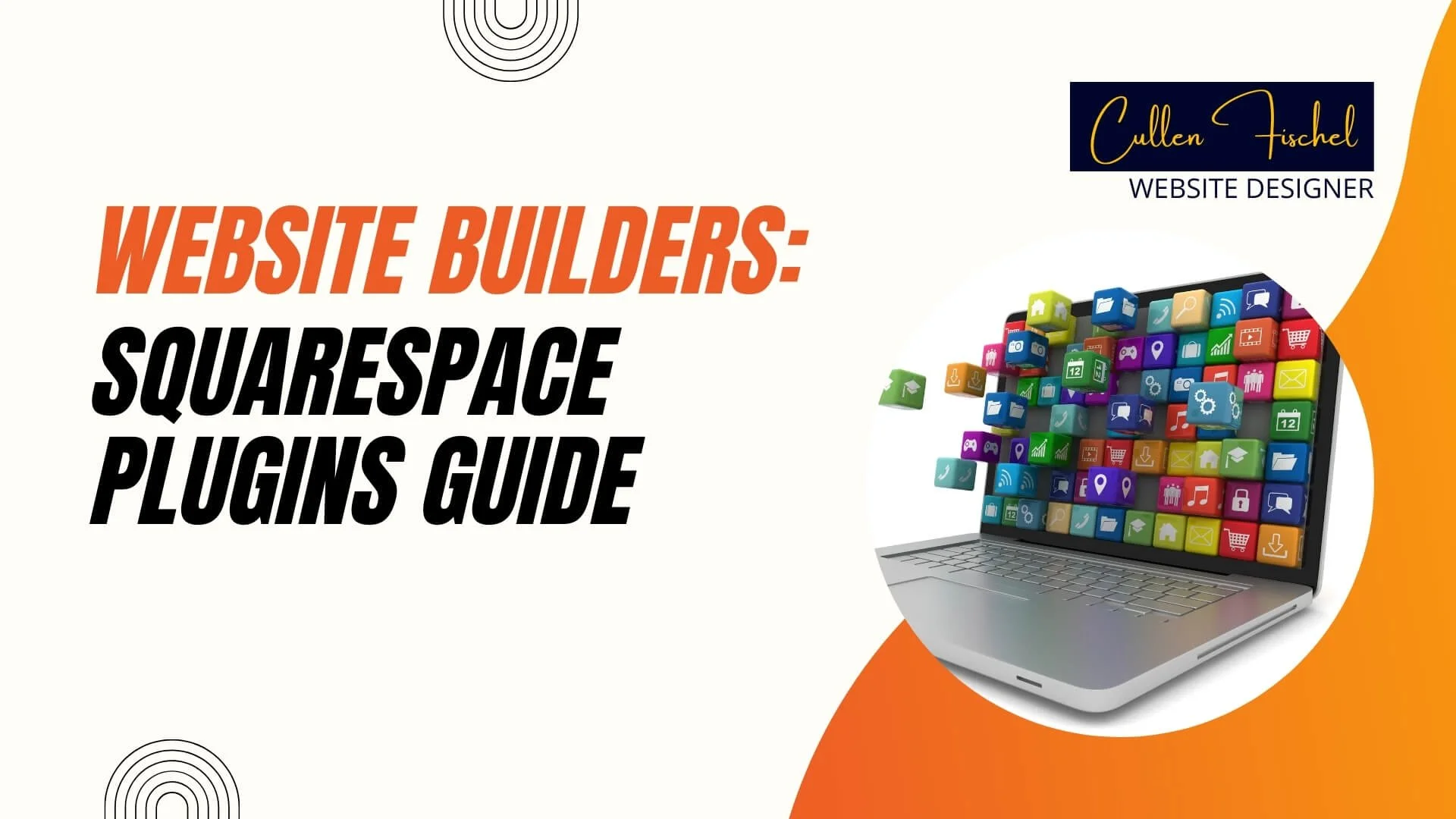How to Choose a Website Builder
How to Choose a Website Builder
Get the perfect website for your marketing goals. Inside advice on website builders, plus tips to make your site stand out.
Cullen Fischel | MARCH 29, 2024 | 5 min. read
5 minute read
By Cullen Fischel, website designer
As a Cleveland web design professional, I’ve seen firsthand the power a great website has to drive digital marketing success. Your website is often your first impression with potential customers – it's your digital storefront!
It's got to be professional, easy to navigate, and make people want to take action, whether that's contacting you or buying your products.
A well-designed website can also help your SEO (Search Engine Optimization), making it easier for people to find you on search engines like Google. Plus, with many of today's website builders, you have tools to track website traffic and see how your marketing efforts are performing.
Let's be honest, if you're serious about growing your business online, you need a modern, effective website. But which website builder is right for you?
Key Takeaways
The right website builder is like a powerful tool in your marketing toolbox. Find the right fit for your needs and goals!
Ease of use, built-in features, beautiful templates, and scalability should drive your choice.
Don't be afraid to try different options – many builders offer free plans or trials.
Consider a custom solution from a Cleveland web designer like me (Cullen Fischel) for complex needs or to seriously stand out.
Understanding Your Needs Before Choosing
Before you start researching builders, take some time to get clear on your specific needs.
What do you envision your website doing for your business, and who's your ideal customer?
Are you comfortable with a bit of coding, or do you want a completely drag-and-drop experience?
And, of course, how much are you willing to spend?
Understanding these things will help you narrow down your choices considerably.
Top Website Builder Evaluation Factors
Ease of Use: Nothing's worse than getting stuck with a site you can't update! Look for intuitive platforms, and check out the builder's support resources (videos, tutorials, etc.) to see if it matches your learning style.
Features: Do you need an online store? A blog? Special booking tools? Make sure the builder provides the functionality you require.
Design Options: First impressions matter! Check out the templates, their customization flexibility, and how they look on mobile devices. Your site should reflect your brand!
Cost: Website building can be affordable, but factor in monthly fees, premium features, and the cost of your own time if it's a DIY project.
Scalability: The ideal scenario? Your website grows with your business. Choose a builder that gives you room to expand.
Popular Website Builder Options
There's no single "best" website builder – it depends on your goals. Here's a quick rundown of popular choices, all with pros and cons:
WordPress.org
WordPress.org is a powerful tool for businesses needing great flexibility, customization, and the ability to scale. However, if you're looking for the absolute easiest setup or lack technical knowledge, a more beginner-friendly drag-and-drop website builder might be a better starting point.
Ease of Use
Learning Curve: WordPress.org has a steeper learning curve than many drag-and-drop website builders. It requires some knowledge of basic coding (HTML/CSS) and familiarity with web hosting concepts.
User-friendliness: The WordPress dashboard is relatively intuitive, but customization options can get overwhelming for beginners.
Support: WordPress has a massive online community providing extensive documentation, tutorials, and forums for support.
Features
Flexibility: WordPress.org is incredibly flexible. With thousands of plugins and themes, you can add virtually any functionality, from eCommerce and booking systems to advanced membership portals and forums.
SEO: WordPress is inherently SEO-friendly but requires optimization with plugins like Yoast SEO for best results.
Blogging: WordPress began as a blogging platform and still excels in this area.
Design Options
Templates (Themes): Countless free and premium WordPress themes offer a wide range of design styles.
Customization: Themes provide a base, but full design control requires coding skills or a page builder plugin for more visual editing.
Responsiveness: It's important to choose a mobile-responsive theme to ensure your site looks great on all devices.
Cost
Software: WordPress.org itself is free and open-source.
Associated Costs: You will need to pay for web hosting, a domain name, and any premium themes or plugins you choose. Some custom development may be needed for complex features.
Overall: WordPress can be quite affordable, but advanced setups can increase costs.
Scalability
Handling Growth: WordPress.org can handle high traffic and complex websites with the right hosting and configuration.
Limitations: Scaling may require expertise in server management or finding a hosting provider that can support your growth.
Overall: For businesses anticipating significant growth, WordPress.org offers the flexibility to scale alongside them.
Shopify
Shopify is a top choice if your primary goal is setting up an online store. It prioritizes user-friendliness and offers all the essentials for successful eCommerce.
If you need a website with complex functionality beyond a store (like an extensive forum or advanced membership features), you might explore a combination of Shopify for the store and another platform for the rest of your site.
Ease of Use
Overall: Shopify is known for its user-friendliness. It was designed specifically for businesses that need to get an online store up and running quickly.
Interface: The dashboard is intuitive, and the setup process provides helpful guidance.
Technical Knowledge: Minimal coding knowledge is required for basic store setup and management.
Features
eCommerce Focus: Shopify excels at all things eCommerce – product management, secure payments, shipping options, abandoned cart recovery – the essentials are built right in.
Additional Features: It offers a blog, basic SEO tools, and an app store to extend functionality (marketing, customer service, etc.).
Limitations: For highly customized functionality beyond typical eCommerce, you might need developer assistance.
Design Options
Themes: Shopify has a good selection of free and premium themes with a focus on modern, product-centric designs.
Customization: Themes offer some flexibility, but full control over the look and feel may require coding knowledge or a Shopify developer.
Mobile-ready: Shopify themes are designed to be mobile responsive.
Cost
Plans: Shopify has tiered subscription plans with varying features. Costs increase based on the features and sales volume of your store.
Transaction Fees: Unless you use Shopify Payments, there are transaction fees in addition to the monthly plan.
Add-ons: Apps from the Shopify App Store often have additional fees.
Scalability
Handling Growth: Shopify is built to scale with your business. It can handle high sales volumes and traffic.
Shopify Plus: This enterprise-level plan is designed for very large, complex stores with custom needs.
Overall: Shopify makes scaling your online store relatively straightforward.
Squarespace
Squarespace is excellent if you prioritize beautiful design and an easy-to-use interface.
It's great for portfolios, creative businesses, and those needing a well-rounded website with basic to moderate eCommerce functions. If highly advanced features or maximum scalability are crucial, a more flexible platform might be a better fit.
Ease of Use
Drag-and-drop: Squarespace features a user-friendly, drag-and-drop interface, making it easy to build pages without any coding knowledge.
Intuitive Editing: The visual editing tools are straightforward, allowing for quick adjustments to content and design elements.
Support: Offers excellent documentation, video tutorials, and customer support.
Features
All-in-one: Squarespace provides essential website features like blogging, basic SEO tools, analytics, and even email marketing capabilities.
eCommerce: Offers eCommerce functionality on its higher-tiered plans, but it might not be as robust as a dedicated platform like Shopify.
Focus: Squarespace prioritizes visually appealing websites over highly customizable, complex functionality.
Design Options
Templates: Squarespace is renowned for its beautiful, modern templates designed to impress across various industries.
Customization: Templates provide flexibility for adjusting colors, fonts, and layouts, but true code-level control is limited.
Mobile-friendly: All templates are inherently mobile responsive.
Cost
Subscription Plans: Squarespace offers tiered plans, catering from basic websites to those with eCommerce needs.
Additional fees: Using premium features or certain integrations may incur extra charges.
Overall: Squarespace is generally a cost-effective option, especially for visually-driven websites.
Scalability
Mid-Range: Squarespace handles website growth well for many businesses. It can support decent traffic levels and increased content.
Limitations: For extremely high traffic websites or those with highly specialized features, other platforms might offer greater scalability.
Overall: Squarespace is a good option if you anticipate moderate growth and don't require exceptionally complex functionality.
Wix Studio
Wix Studio is a powerful option if you prioritize design flexibility and want to create pixel-perfect, unique websites. It's a great fit for web designers, agencies, or businesses that are comfortable with a slightly steeper learning curve in exchange for more control
If you want a super simple setup process and templated guidance, the classic Wix Editor might be more suitable.
Ease of Use
Two Main Editors: Wix offers two primary website building experiences:
Classic Wix Editor: Very beginner-friendly with drag-and-drop tools and guided setup.
Wix Studio (formerly Editor X): More advanced interface, catering towards designers or those desiring more design control.
Studio Learning Curve: Wix Studio has a steeper learning curve compared to the classic editor and some other drag-and-drop builders. It requires a bit more design knowledge.
Support: Offers support with tutorials and articles, though community help might be less extensive compared to the wider Wix user base.
Features
Studio's Focus: Wix Studio prioritizes advanced design features and customization over a huge array of built-in functionalities like a dedicated eCommerce or booking system.
Flexibility: Gives you tools to create custom layouts, interactions, and animations.
App Market: You can expand Studio's functionality through the Wix App Market.
Limitations: Some users might miss the guided structure of the classic Wix editor if not design-savvy.
Design Options
Creative Control: Wix Studio's superpower is its design flexibility. It allows precise control over layouts, responsiveness, and visual elements.
Templates: While there are templates, Wix Studio leans towards starting from a blank canvas or heavily customizing layouts.
Responsive Design: Studio offers comprehensive tools to optimize your website for different screen sizes, essential in today's world.
Cost
Multiple Plans: Wix Studio has separate pricing plans from the classic Wix Editor, generally aimed at professionals and businesses needing advanced websites.
Free Version: A free plan exists, but with significant limitations (Wix branding, limited storage).
Overall Cost: Studio plans tend to be slightly more expensive than classic Wix plans due to its more professional features.
Scalability
Good Fit for Growth: Wix Studio handles website growth and increased complexity quite well.
Flexibility as You Scale: It offers the customization capabilities to evolve the website's design and functionality as your business expands.
Potential Complexity: For extremely complex websites, there might be a point where a fully custom solution with a developer is a better long-term investment.
Cullen Fischel's Tips for Success
Clarity is key: Before you start comparing features, have a crystal-clear plan of what you need your website to do.
Don't be afraid to experiment: Most builders offer free plans or trials, so take them for a test drive!
Want something truly unique? Consider hiring a Cleveland web designer (that's me!) for a completely custom build tailored to your business.
Always think ahead: Pick a website builder that can grow and adapt as your business needs change.
Ask a Website Designer
Do I need web design experience to use a website builder?
Not necessarily! Most modern builders are user-friendly, but some are easier than others. If you get overwhelmed easily, look for platforms known for drag-and-drop interfaces, tutorials, and support. Or consult with a website designer for help.
Can I move my website to a different builder later?
Sometimes. It depends on the builder, and it might get a bit technical. That's why it's important to research migration options before getting locked into any single platform.
What's the difference between website builders and content management systems (CMS)?
Website builders prioritize ease of use, while a CMS like WordPress.org gives you advanced customization power but may be less beginner-friendly.




